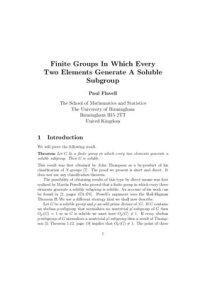
Ebook: Finite groups in which every two elements generate a soluble subgroup
Author: Flavell P.J.
- Genre: Mathematics // Symmetry and group
- Tags: Математика, Общая алгебра, Теория групп
- Language: English
- pdf
UK.: Birmingham. [Invent. Math. 121 (1995) No. 2, 279-285, eBook, English]We will prove the following result:
Theorem. Let G be a finite group in which every two elements generate a soluble subgroup. Then G is soluble.
This result was first obtained by John Thompson as a by-product of his classification of N -groups [7]. The proof we present is short and direct. It does not use any classification theorem.
The possibility of obtaining results of this type by direct means was first realized by Martin Powell who proved that a finite group in which every three elements generate a soluble subgroup is soluble. An account of his work can be found in [2, pages 473-476]. Powell’s argument uses the Hall-Higman Theorem B. We use a different strategy that we shall now describe.Contents
Introduction
Preliminaries
Normal p-subgroups
Normal p'-subgroups
Proof of Main Theorem
References
Theorem. Let G be a finite group in which every two elements generate a soluble subgroup. Then G is soluble.
This result was first obtained by John Thompson as a by-product of his classification of N -groups [7]. The proof we present is short and direct. It does not use any classification theorem.
The possibility of obtaining results of this type by direct means was first realized by Martin Powell who proved that a finite group in which every three elements generate a soluble subgroup is soluble. An account of his work can be found in [2, pages 473-476]. Powell’s argument uses the Hall-Higman Theorem B. We use a different strategy that we shall now describe.Contents
Introduction
Preliminaries
Normal p-subgroups
Normal p'-subgroups
Proof of Main Theorem
References
Download the book Finite groups in which every two elements generate a soluble subgroup for free or read online
Continue reading on any device:

Last viewed books
Related books
{related-news}
Comments (0)